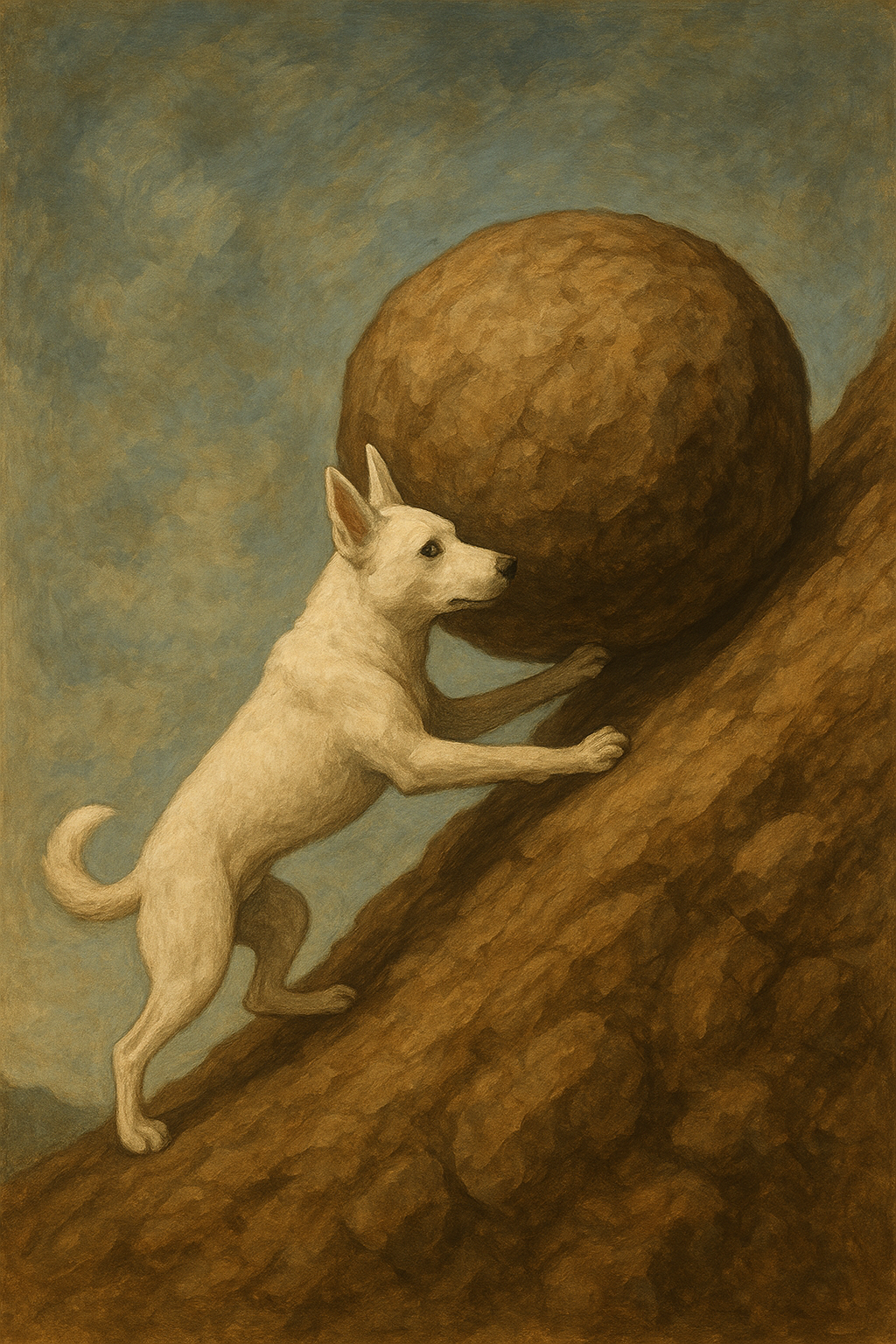A Happy Sisyphus

"One must imagine Sisyphus happy," Camus concluded in his essay The Myth of Sisyphus.
Tricking the God of Death, Sisyphus was punished by the Greek gods. He was made to roll a stone to the top of a mountain ceaselessly. Seeing the stone falling back to the bottom of the hill every time, Sisyphus would go back to the bottom of the hill and push it up the summit again. This repeats eternally. Homer described it in the Odyssey:
And I saw Sisyphus in torment, pushing a giant rock with both hands, leaning on it with all his might to shove it up towards a hilltop; when he almost reached the peak, its weight would swerve, and it would roll back down, heedlessly. But he kept on straining, pushing, his body drenched in sweat, his head all dusty.
One needs to be truly imaginative to imagine Sisyphus happy, save for huge HYROX fans.
Let us set aside Greek mythology for a moment and consider our secular lives. We, humans, are also tirelessly pushing a boulder uphill, only to see it falling time and again. We work to earn money, hoping that one day we will feel financially secure enough to pursue our dream. We exercise and follow a diet to stay healthy. We build relationships to avoid loneliness. We wish to believe that, in all these, there is some meaning.
Yet, the Universe could not care less about us, or our meanings. People's assets evaporate in "financial crises" (whatever that means). Diseases and accidents break people and families regardless of their 5-step daily health protocols. People come and go, no matter how hard you try. And of course, death is the ultimate equalizer that turns everything into nothingness.
Camus called this constant struggle – the struggle between humans trying to find a purpose and the Universe not providing one – the absurd. Camus considered three solutions to the absurd: suicide, religion, and revolt.
Suicide is admitting defeat to the absurd by refusing to live a life without meaning. Religion is believing that while this life may be meaningless, something better is waiting for us after this life. Camus rejected both ideas.
Revolt is the only way against the absurd, Camus argued. Despite life's meaninglessness, we accept the fate dished out to us and experience life as fully as possible. We create and leave our footprints on this Earth. These creations will be the evidence of mankind's dignity, effort, and perseverance.
Easier said than done. Anyway, let us turn our attention back to Greek mythology.
When is Sisyphus most upset? (I am using the present tense here as this is eternity.) The toll is obviously no fun. But the worst part, I imagine, is the consciousness knowing that the suffering will begin again when he returns to the bottom of the hill, and there will be no end to it.
Strangely, this was when Camus imagined Sisyphus happy:
"At each of those moments when he leaves the heights and gradually sinks towards the liars of the gods, he is superior to his fate. He is stronger than his rock."
"Where would his torture be, indeed, if at every step the hope of succeeding upheld him? The lucidity that was to constitute his torture at the same time crowns his victory. There is no fate that cannot be surmounted by scorn. If the descent is thus sometimes performed in sorrow, it can also take place in joy."
Each of us has our own boulder to push. While we are hardly in as dire a situation as Sisyphus is put in, diseases, disasters, bureaucracy, idiots, and self-serving narcissists always kick the boulder, and ourselves, back to the bottom of the mountains. If we wish to continue living, our only option is to push again and again.
Fortunately, we are not as doomed as Sisyphus. (Forgive me for using the word doomed here. Not being philosophical enough, I am still seeing Sisyphus's situation in a negative light.) Instead of climbing the same slope again and again, life to me is more like a long hike, with a variety of stiff cliffs, valleys, and highs and lows. While we do have to push a huge rock, we pick our own cross to bear, and like Sisyphus, we can choose whether to trek in sorrow or in joy. Meanings are created in our struggle and bravery to love, take risks, and live, even though we know that all is likely to go in vain.
The Myth of Sisyphus is a very difficult read, but I think it could be summed up in a saying my mum loves to tell me: "開心又係咁做,唔開心又係咁做,點解唔開開心心咁做呢?" When I was younger, I hated hearing it. But, as always, there is always more wisdom in our parents' teaching than we are willing to admit.

Comments ()